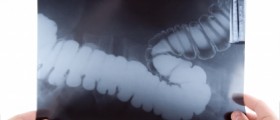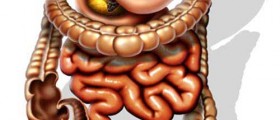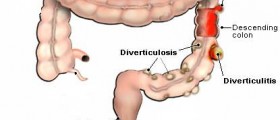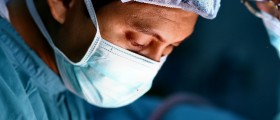
Seven percent of people suffer from colon cancer. The most common symptom of colon cancer is blood in the stool, but other symptoms includes pain in the stomach, loss of appetite and weight and fatigue. After a medical examination, a doctor will send a patient for a scope examination of the rectum. When colon cancer is diagnosed, doctors suggest surgery. Whether or not a person will undergo the surgery depends thoroughly on the individual.
Surgery is the only means to remove colon cancer and in most cases it is followed by radiation and chemotherapy.
Before the surgery is carried out, a patient is given strong laxatives or a special solution to clean the colon. Under general anesthesia, a surgeon cuts the abdomen open and takes out the diseased colon. Other parts of the colon are connected by sutures, special medical thread. If there is cancer in the rectum, a patient undergoes a colostomy, in where the intestine is connected through the outer part of the abdomen. In this case, stools move from intestines to the bag attached to the patient's abdomen. After several months, it is possible to connect the colon again.
After the surgery, special care is taken to inspect the other parts of the body and lymph nodes so as to determine whether or not the cancer has spread.
Anesthesia in any operation can cause strokes and blood clots and complications on kidneys and lungs. After surgery, blood clots can make the legs swollen and can move to lungs. Short breath and pains are the symptoms so it is important to tell the doctor if a person have these problems. A wound can become infected in any operation, so if this happens, antibiotics are used to solve the problems and in some cases even surgery. During the operation and after it, a patient may bleed intensely in which case blood transfusion is necessary.
Complications specifically related to colon surgery include: injuries on bladder, intestines, uterus and ovaries and on abdominal wall. Sometimes intestines can be pushed under the skin and then another operation is needed. Also, the part where the ends of the colon are connected, anastomosis, may become infected and cause other abdominal infections. Colostomy may be needed to connect properly the colon. However, all of these complications are not that common.
After the surgery, a patient is not allowed to eat or drink for a few days. A tube is placed through the nose in the stomach to help suck out the air from stomach. Depending on the condition and recovery, a patient is allowed to eat and drink after a certain time. If a patient feels weak or has a fever, pains or swelling, they should contact the doctor. Further examinations are performed after the operation and in the case of cancer spreading, radiation or chemotherapy may be needed.

















Your thoughts on this
Loading...